Ancestor worship in Vietnam: a living tradition
Imagine traveling to Vietnam. You are invited to dine with a Vietnamese family. Upon arrival you notice a special table with pretty flowers, fruit and candles. You are told that this is the altar of the ancestors, in front of which the family gathers to pray for the ancestors. Seeking their blessing and support, Islands family members offer them food and drink. This ceremony intrigues you, and you learn that this tradition, which dates back thousands of years, is still very much alive today and is an essential element of Vietnamese culture. However, you don’t know much about it.
Here are some details about ancestor worship in Vietnam that might satisfy your curiosity.
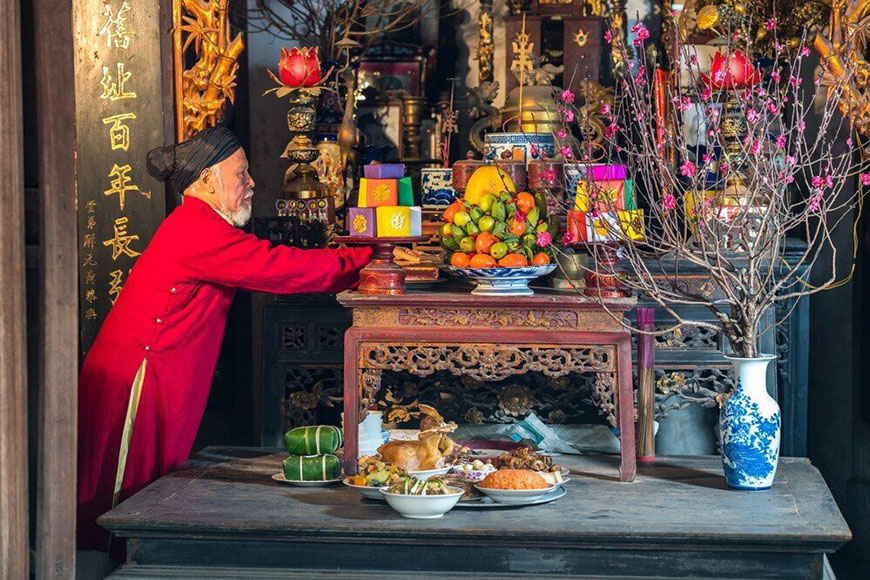
Altar of Ancestors - Photo : vietnamevasion
Ancestor worship in Vietnam, a millennial origin
Much is still unknown about the origins of this animistic belief, but it may date from the Dong Son civilization, which flourished in Vietnam from the 2nd millennium BCE to the 1st century AD. The Vietnamese of that time believed that the dead lived in another world and that they could influence the lives of the living. They showed them respect by building shrines and making sacrifices.
The influence of Confucianism
This belief system was later codified and supported by Confucianism, the dominant doctrine in Vietnam since the 11th century.
Confucianism affirms that ancestors are venerable beings who survive after death. They are seen as the protectors of their descendants and should be honored and respected. Ancestor worship is therefore a manifestation of filial piety, one of the five great Confucian duties. Moreover, the influence of Confucianism is also manifested in the belief in the continuity of life after death, a fundamental belief in the cult of ancestors as it motivates to pay tribute to them and to seek their protection. Confucianism teaches that filial piety is a child’s most essential duty to his parents. This obligation continues even after the death of the parents, and the worship of the ancestors is a way of expressing this piety. As for those known as Khong Tu ou Khong Phu Tu in Vietnamese, their doctrine emphasizes the family as the basic unit of society. Ancestor worship strengthens family ties and promotes social harmony. Over the centuries, this spiritual practice has changed and been enriched with new beliefs and practices. It has also spread to other Asian countries, including China, Japan and Korea, but Vietnam is where it is most important to families and society as a whole. Even today, Vietnamese people believe it is important to respect and venerate their ancestors, because they are the guarantors of the prosperity and happiness of the family.
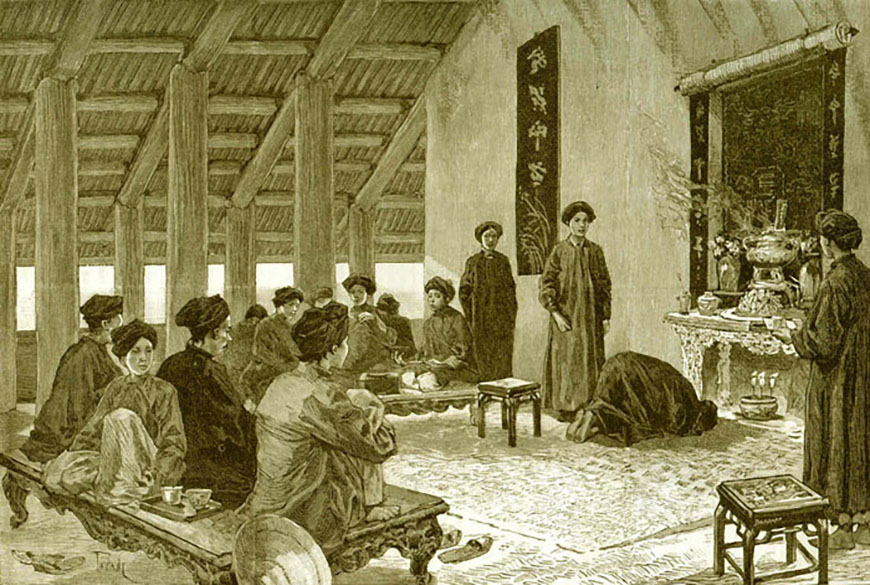
Worshiping Ancestors - Photo : Internet
Once upon a time… The cult of the ancetres in Vietnam
Ancestor worship is also based on tales and legends.
One of the best known is the story of Princess Lieu Hanh, who became a protective deity for the Vietnamese people. Lieu Hanh was the daughter of the heavenly king Ngoc Hoang (the Jade Emperor), who drove her out of heaven for overturning a jade cup. She was born on earth as Pham Tien Nga and lived a virtuous life for 23 years, marrying Tran Dao with whom she had two children, Nhan and Hoa. After her death, she returned to heaven and received the title of Princess Lieu Hanh. Lieu Hanh is one of the four immortals of Vietnamese mythology and is also an important figure in the cult of the mother goddess Dao Mau.
In close connection with Vietnamese popular culture, many legends and superstitions tell the relationship between the living and the dead. For example, it is also said that one day, a man named Tiet Dinh Cong was saved by his deceased grandfather. The latter appeared to him in a dream and told him to hide in a tree to escape an attack. The man followed his grandfather’s advice and was able to escape death. Another tale tells the story of a woman who was helped by her deceased husband to find her lost son. The wife dreamed of her husband, who asked her to go to a specific place. She went there and found her son, who had been missing for years.
These tales and legends illustrate the importance of ancestor worship for the Vietnamese people. They believe that the deceased can help and protect them.
Rites and ceremonies around the worship of ancetres in Vietnam
Families often have a family altar at home, where they put tablets commemorating their ancestors.
Ancestor worship is manifested through rituals and ceremonies that take place on different occasions. The most important is Têt, the Lunar New Year, during which the Vietnamese honor their ancestors for several days. Other occasions to celebrate ancestor worship are the anniversaries of their death, marriage and birth. At these events, families gather to pray for their ancestors and make offerings, such as food, flowers and incense sticks.
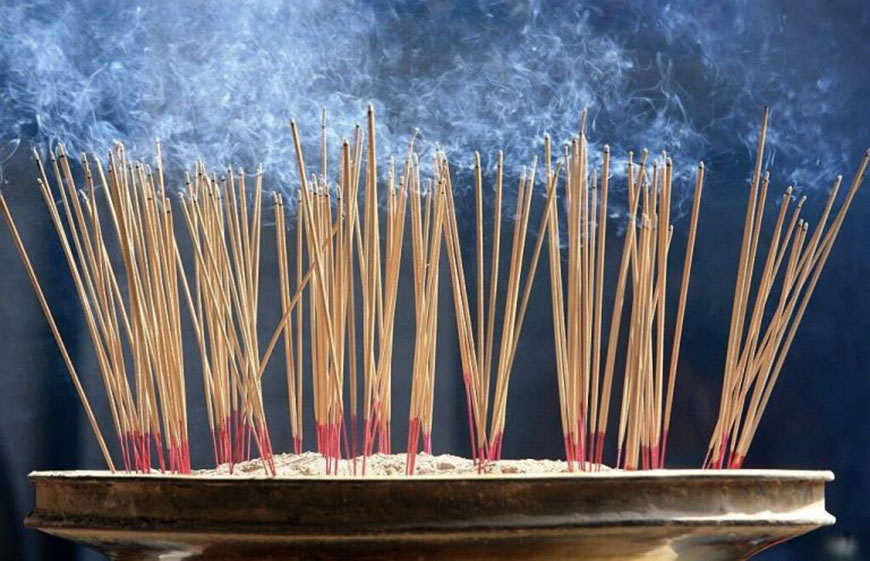
Communicating with Ancestors - Photo : Internet
The most common rites to worship ancetres
- ♦ Offerings: Families offer fruits, food, wine and incense to their ancestors. Food and fruit are often traditional Vietnamese dishes like rice, vegetables, fruits and meats. Wine is offered to calm the ancestors, while incense is burned to invoke their presence.
- ♦ Prayers: Families pray to their ancestors, asking for favours, protection and advice. These prayers are usually said in Vietnamese, but they can also be said in other languages, depending on the religious beliefs of the family.
- ♦ Ceremonies: Families organize special ceremonies to honour their ancestors. These ceremonies usually take place on important occasions such as the Lunar New Year, birthdays of ancestors or anniversaries of their deaths.
The cult of ancestors in Vietnam, an importance as much spirtituelle as societal
The tradition of ancestor worship is of great importance in Vietnam for several reasons.
First, it is a way for the Vietnamese to show their respect to their ancestors. It allows them to remember their loved ones and express their gratitude. Then, ancestor worship allows the Vietnamese to consolidate their family and community identity. It reminds them that they belong to a long lineage and connects them to other members of their family and community. Finally, ancestor worship brings comfort and protection to the Vietnamese people. They believe that their ancestors can support them in difficult times and help them achieve their goals.
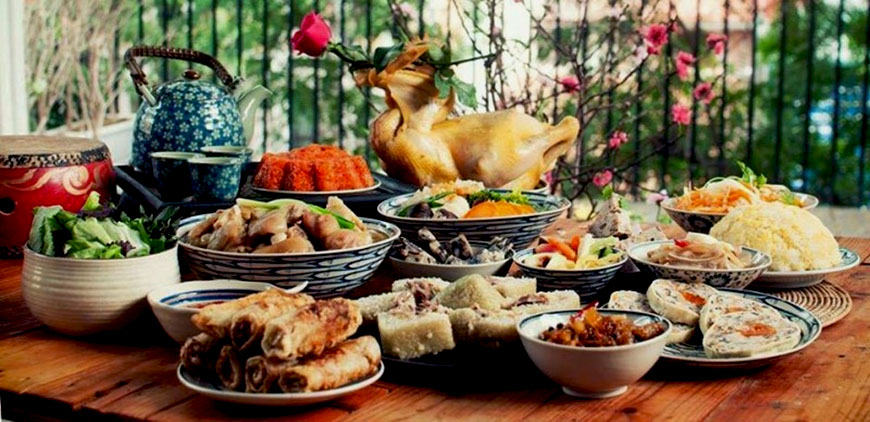
Special Dishes for New Year Tet - Photo : vietnamtimes
A lasting tradition?
We have seen that the veneration of ancestors is a tradition deeply rooted in Vietnamese culture.
It is difficult to predict whether this tradition will continue over time, but it will certainly continue to be of great importance to the Vietnamese. Ancestor worship is an ancient tradition that has survived the test of time. It is still very much alive today, even in large modern cities. However, some experts question the sustainability of this tradition. Vietnamese are increasingly influenced by Western culture, which places less emphasis on ancestor worship.
What is your opinion? Will veneration of ancestors be a tradition that will adapt to the evolution of society?
How Mr Linh'adventures can help you discover ancestor worship in Vietnam
If you want to deepen the cult of ancestors in Vietnam, Mr. Linh’s Adventures is here for you. We offer authentic tours that introduce you to Vietnamese culture from the inside. During our tours you can visit Vietnamese houses and see altars of ancestors. You will learn the rituals and ceremonies of ancestor worship. We will also help you understand the meaning of ancestor worship in Vietnamese society. You will see how this tradition influences the lives of Vietnamese today.
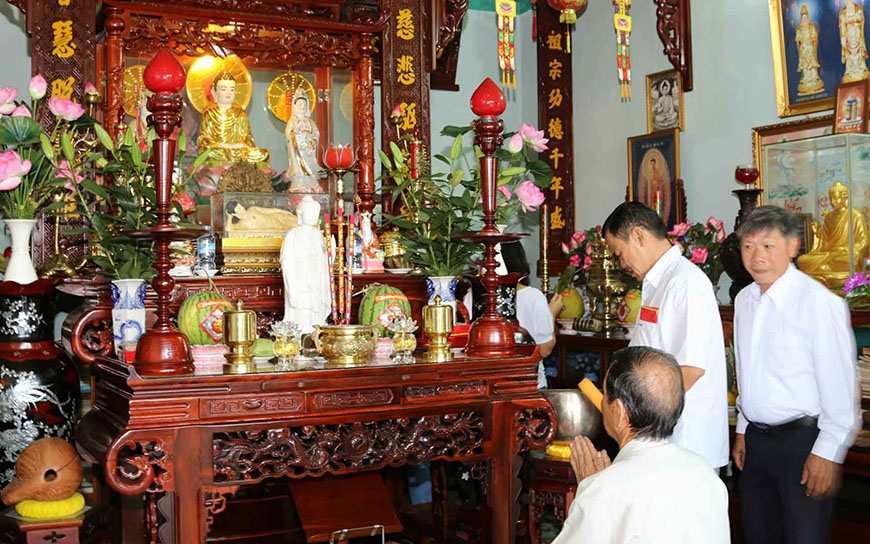
Altar of Ancestors - Photo : Internet
To go beyond…
Beyond filial piety, a network of reciprocity
Most blogs present the cult of ancestors in the smooth tones of filial piety and the tradition of recalling one’s duties.
But reality is much richer, woven with threads of fear, gratitude and a powerful belief in invisible forces. It is a cosmic exchange: offerings of food, incense and prayers rise, seeking blessings - good health, prosperity, advice - from ancestors perched on the edge of the abyss of the other world. In return, their vigilant spirits protect their descendants, guiding them on the winding path of life. The cult of ancestors in Vietnam is more than a simple tradition, it is the foundation of their cultural identity, engraved in the very fabric of their society. A 2019 survey by the Pew Research Center found that an astonishing 93% of Vietnamese believe in the continued existence of their ancestors and 82% actively worship ancestors (Nguyen et al., 2019). This respect is not limited to the home; a 2017 report from the General Bureau of Statistics of Vietnam revealed that over 70% of businesses and government offices maintain altars for ancestor worship (General Bureau of Statistics of Vietnam, 2017).
But what is behind these statistics? Why does this seemingly simple practice have such profound meaning? The answer lies in the complex mosaic of Vietnamese beliefs.
For many Vietnamese, death is not an end, but a transformation. They believe that the soul travels to another kingdom, becoming guardians who watch over their descendants, offering them advice and protection. This sense of inter-generational interconnection fosters deep respect for elders and ancestors, shaping the core values of filial piety and family unity.
Beyond family boundaries, a community of the deceased
It’s not just a private matter. In all Vietnamese villages, you will see ancestral homes - communal shrines dedicated to generations of ancient inhabitants. There, the murmurs of forgotten lives mingle with the present, weaving a fabric of history and belonging. It is a striking contrast to the individualism of the West, a reminder that we are threads woven into a tapestry far larger than ourselves.
Beyond rituals, a dance with the invisible
Rituals are complex performances, not just memorized gestures. From the careful arrangement of offerings to the discreet whispers of prayers, every detail makes sense. There is a sensitive tension in the air, the feeling of crossing borders, probing the unknown, and sometimes, say the whispers, the ancestors respond. A trembling flame, a butterfly flying near the altar - these are signs, proofs of an invisible dialogue.
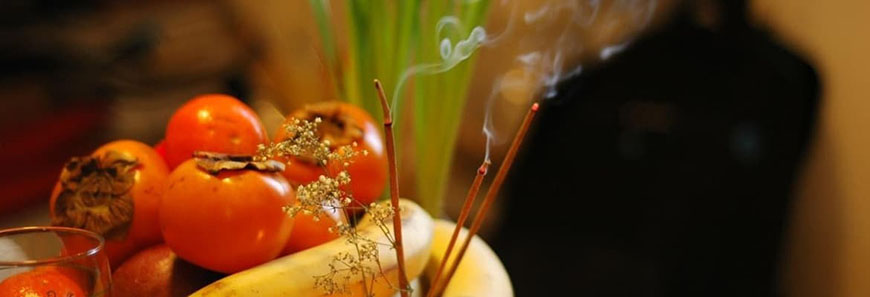
Offerings to the Ancestors - Photo : Internet
Beyond generations, a living tradition in a modern world
Veneration of ancestors is not just passive veneration, it is a living dialogue, a permanent exchange between the living and the deceased. Offerings of food, drink and burnt incense sticks are symbols of gratitude, respect and a request for continued blessings. Rituals like Tet, the Vietnamese Lunar New Year, become joyful gatherings where the living invite their ancestors to return to earth and share the festivities. However, the tapestry of ancestor worship is not without imperfections. The emphasis on filial piety can sometimes create pressure and expectations on younger generations. In addition, this practice faces the challenges of modernization and urbanization. Reduced apartment space and busy lifestyles can make it difficult to maintain altars and traditional rituals.
Is this ancient practice being extinguished in the neon light of 21st century Vietnam? Strangely, not at all.
Ancestor worship remains strong in Vietnam, with younger generations actively participating. Some explain this resilience by the upheavals caused by war and migration, a desperate anchor in a chaotic world. Others see it as a foundation for social cohesion, a reminder of shared history and responsibility. Nevertheless, despite these challenges, the whispers of ancestors continue to resonate in the bustling cities and peaceful villages of Vietnam.
In an increasingly individual-centred world, this ancient practice offers a powerful reminder of our interconnectedness, our roots and the lasting legacy of those who came before us.
Sources:
Institute of Sociology, Hanoi: "Religion and Belief in Vietnam in the 21st Century" (2020)
Nguyen Thi Thu Thuy, "The Influence of Ancestor Worship on the Social Life of the Vietnamese People" (2018)
Keith Taylor, "The Vietnamese Tradition of Ancestor Worship" (2013)
Nguyen, D. N., Chau, N. T., & Le, T. K. (2019). Religious Belief and Practice in Vietnam. Pew Research Center. https://assets.pewresearch.org/wp-content/uploads/sites/11/2017/05/15120244/CEUP-FULL-REPORT.pdf
General Statistics Office of Vietnam. (2017). National Survey on Religion and Belief 2014. https://www.gso.gov.vn/wp-content/uploads/2019/03/VHLSS-2014.pdf